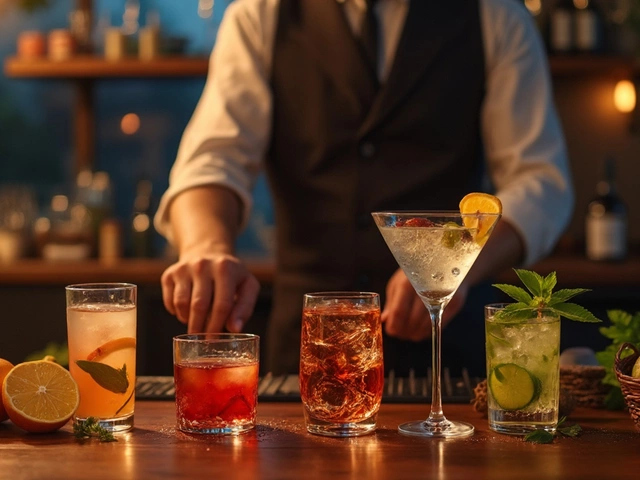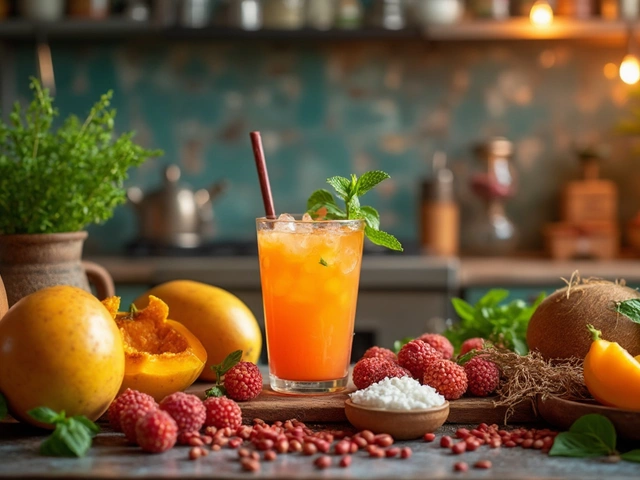
Ah, the notorious hangover—a specter that haunts the morning after a night of revelry. Ever found yourself pondering which specific spirit might be responsible for that throbbing head and uneasy stomach? It’s a mystery that many have sought to unravel, often swearing off one drink or another based on past experiences.
In the quest to understand the demons lurking in our favorite spirits, we find key players like congeners, chemical compounds introduced during fermentation. Coupled with sugar levels and the presence of additional additives, they can influence how dreadful the morning feels. Join us as we explore the surprising culprits behind hangovers and discover thoughtful ways to sip smarter.
- The Role of Congeners in Hangovers
- Examining Common Spirits and Their Effects
- The Impact of Sugar and Additives
- Tips for Reducing Hangover Intensity
- Myths and Lesser-Known Facts
The Role of Congeners in Hangovers
When it comes to exploring the formidable effects of a hangover, understanding congeners can be like finding a missing puzzle piece. Congeners are naturally occurring by-products produced during the fermentation process of spirits. They are present in many of our favorite spirits, and they are the main reason why some drinks are more likely to leave you feeling like a wreckage the morning after. The presence of congeners in alcohol is responsible for its color, aroma, and taste. Given these attributes, congener-rich drinks, such as red wine and dark liquors, may entice both the sommelier and the amateur drinker alike. But these delightful properties come with a catch—they are also the same elements that could lead to one of the worst kinds of hangover.
There's more to why congeners are crucial in the chemistry of hangovers than just their concentration. It has been discovered that darker spirits, such as whiskey, bourbon, and brandy, tend to contain a higher number of congeners as compared to their clearer counterparts like vodka and gin. This is because these darker beverages typically undergo longer aging processes, which allows for a more ample build-up. Importantly, methanol is one such congener that gets metabolized into formaldehyde, a toxic substance that contributes to the ghastly symptoms of a hangover. The connection between congeners and hangovers is such a significant topic that even the American Chemical Society has pondered it:
"Various compounds resulting from the fermentation can significantly influence the reactions those who consume alcohol will experience. From headaches to dizziness, they translate into that aftermath we colloquially know as hangovers."
Interestingly, not all consumers are affected in the same way. Our individual biochemistry plays a role in how our bodies metabolize these congeners. For some, a single glass of whiskey might trigger a world of pain come morning, while others could be blissfully unaffected. This inter-individual variability makes alcohol consumption a unique experience with different consequences for everyone involved. Those looking to minimize their risk might do well to stick with clearer prickly water options, where congeners are conventionally fewer, thus minimizing chances of a severe hangover.
Knowing what's in your drink is essential, but what becomes important is how much control you exert over consumption. While the evening could certainly be filled with laughs and clinking glasses, an increasing intake of congener-laden spirits might tip an enjoyable evening towards that dreaded morning of regret. Embracing moderation is typically key. Various approaches, including hydrating between drinks, proper nourishment beforehand, and pacing self-consumption, can mitigate hangover risks. While the science of congeners might not offer a perfect shield from a miserable morning, understanding them certainly arms you with knowledge that can promote better choices at the bar.
Examining Common Spirits and Their Effects
The hangover battle begins even as we clink glasses, a subtle dance between the drink we choose and its ingredients. Each spirit carries a unique signature blend of chemicals, which can sway how we feel the next day. The foundation of this entire dance is ethanol, the active ingredient in all alcoholic beverages. However, it’s the congeners, fermentations’ darker byproducts, that vary widely among spirits and wreak havoc on our systems in different ways. Congeners include methanol, acetone, and several types of tannins, which give spirits their rich flavors and colors. Darker spirits like whiskey, rum, and red wine tend to have higher congener levels, leading to potentially harsher morning-after experiences.
Whiskey: The Charmer with a Heavy Price
Still one of the most beloved and consumed spirits worldwide, whiskey is infamous for its intense congeners cocktail. While it's cherished for its warming glow and deep flavors, these very qualities emerge from compounds that can lead to pounding headaches and formidable fatigue. The aging process in charred barrels magnifies both whiskey's complexity and congener content. An intriguing analysis by the Alcohol Hangover Research Group found that bourbon, in particular, has one of the highest congener indices, passing red wine and brandy. Therefore, although sipping whiskey might feel like a sophisticated choice, it may require strategic planning with ample water and rest to mitigate the next day’s effects.Vodka: The Stealthy Sip
Interestingly, vodka is often referred to as a "neutral spirit," being significantly lower in congeners compared to its darker cousins. This distinction makes vodka many people's go-to for minimizing hangover severity. However, all is not fair and clear; flavored vodkas often mask sugar or artificial additives that can quietly amp up your hangover risks. An everyday tip? Choose plain vodka and pair it with club soda to keep the mix simple.Tequila: The Spirited Surprise
Tequila’s reputation often precedes it, yet when consumed in moderation and crafted with 100% agave, it's surprisingly gentle on the system. However, many "mixto" tequila, combined with sugars and other grains, can still lend to hangover misery. A little-known fact from the Beverage Testing Institute states that high-quality tequila has fewer gaps in terms of congeners similar to vodka. This might come as a relief to those who enjoy margaritas or straight shots."Hangovers are complex reactions, and adding a single factor can dramatically affect the severity,” notes Dr. Michelle Stranraer, an expert in toxicology.
Knowing your spirits is pivotal in heading off next-morning misery, bolstered by the knowledge of their intrinsic chemical compositions. These insights can guide us to sip with foresight and nurture mornings less haunted by our toasts’ echoes. But always remember, moderation is the true key to experiencing the full, vibrant spectrum of alcoholic wonder, without the grisly hangovers.

The Impact of Sugar and Additives
When considering why some spirits leave you regretting the night before, sugar content and additives often play significant roles. Many drinkers can attest to the sharp headache that seems to follow an indulgent night sipping on sugary cocktails or flavored liquors. The natural fermentation process doesn't inherently produce sugary drinks; this sweetness is often added after the fact to enhance taste, making the drink more appealing to a broader audience. However, this added sugar sets the stage for more severe hangover symptoms, mainly because it accelerates dehydration—a crucial player in hangover discomfort. When your body tries to metabolize alcohol, a liver enzyme called alcohol dehydrogenase breaks it down, but the additional processing of sugars further burdens your system, leading to intense fatigue and headaches.
Additives in spirits can also significantly exacerbate hangovers. These might include artificial colors, flavorings, or preservatives that give your favorite drinks their characteristic taste and hue. While enticing, such additives can create a more challenging situation for your body to handle than pure spirits. They introduce foreign substances, putting extra stress on your liver. For example, many sugary mixers in cocktails—often overlooked—are culprits in hangover severity. A piña colada or a daiquiri may seem harmless, but they pack a sugary punch that can lead to pronounced morning-after effects.
"Excessive sugar can worsen hangover symptoms due to its diuretic effects, much like alcohol," says Dr. Sam Wass, a well-known researcher on alcohol’s impact on the human body.Sugary drinks can cause a spike in blood sugar levels, followed by a rapid decline, leading to classic symptoms of hypoglycemia such as weakness, confusion, and dizziness. Attention to this aspect of spirits and their components is crucial for those who enjoy an evening tipple yet wish to avoid the unpleasant aftereffects. Thus, choosing drinks with fewer additives or diluted with non-sugary mixers can significantly impact the severity of hangovers, potentially allowing for a much clearer and more productive morning.
Furthermore, some additives like sulfites, often found in wines but also present in some spirits, can cause heightened reactions in sensitive individuals. These are primarily used as preservatives but can lead to allergic reactions and increased hangover symptoms for some. Being mindful of what exactly is in your drink can not only make for a less painful morning but also guide you to healthier drinking practices overall. After all, understanding what goes into your alcohol of choice can illuminate ways to enjoy your beverage without the heavy price tag of a lingering hangover.
Tips for Reducing Hangover Intensity
Hangovers are the unwelcome guests that follow a night of indulgence, and while there's no surefire way to avoid them completely, certain strategies can help ease their severity. The first step in tackling hangover woes is staying hydrated. Alcohol wreaks havoc on the body’s hydration levels, so it's critical to drink water both during and after consuming spirits. Make sure to alternate each alcoholic beverage with a glass of water to balance the intake. This simple trick can make a considerable difference in how you feel the next day.
Another savvy approach involves eating a balanced meal before heading out. Consuming foods rich in carbohydrates and healthy fats can slow down the absorption of alcohol into your bloodstream. Picture it as lining your stomach with a protective layer, lessening alcohol's aggressive impact on your body. Additionally, foods like avocados, nuts, and olive oil are excellent sources of healthy fats that can help cushion the stomach lining.
Avoid sweet mixers, as their sugar content combines with that in spirits to potentially enhance hangover intensity, notes Dr. Alice Hartman, a nutritionist specializing in the effects of diet on health.
Be cautious about the type of alcohol you choose. Darker spirits, such as whiskey and red wine, contain more congeners, which are byproducts of fermentation and distillation that can exacerbate hangovers. Opting for lighter options such as vodka, gin, or white wine can be gentler on your system. As you craft your drinking game plan, it’s always wise to pace yourself. Spread out your drinks instead of consuming them rapidly. This way, your body has more time to metabolize the alcohol, potentially reducing morning-after misery.
Considering supplements is another route some people swear by. Options like prickly pear, milk thistle, and vitamin B complex are believed to support liver function and might ease hangover symptoms. However, the effectiveness of these supplements can vary, and it’s advisable to consult with a healthcare provider before trying new supplements. When it comes to relieving hangovers, patience mixed with prevention can go a long way. Remember, knowing your limits and recognizing when to stop can prevent headaches in more ways than one.

Myths and Lesser-Known Facts
For those venturing into the curious world of spirits, hangovers are often a primary concern. With hangovers come legends and advice, often passed down through an ever-evolving tradition of lore. One common misconception is the infamous 'hair of the dog' remedy, which suggests that consuming more alcohol—the very culprit of your discomfort—can actually help alleviate a hangover's grip. While it may temporarily numb the senses, it's merely postponing the inevitable headache and does little to address the dehydration and other physical effects of alcohol consumption.
Beyond old wives' tales, there's a scientific curiosity around congeners, those pesky by-products of fermentation and distillation. Some argue that darker spirits, like whiskey and brandy, contain more congeners, which allegedly contribute to worse hangovers. This idea is rooted in research, yet experts insist that moderation remains key, as a heavy night of clear spirits can be just as unforgiving.
"It’s not just what you drink, but how much and how you pair it with other factors, like hydration and food," advises Dr. John Marcellus, a prominent researcher in the field of alcohol metabolism.
On the more quirky side of the spectrum, some aficionados are firm believers in the power of ‘expensive means better’. The thought here is that artisanal or top-shelf spirits, through their meticulous crafting, result in fewer next-day regrets. While quality control in distillation processes may remove some impurities, the key to avoiding a hangover is still bound to the volume and rate of alcohol consumption and not merely the price tag attached to the bottle.
Surprisingly under-discussed are the cumulative effects of sugar and additives, which can exacerbate the unpleasantness of a hangover. Cocktails often hide spirits within sweet syrups and juices; these sugars contribute to inflammation and can rival congeners in delivering discomfort. The unsuspecting Margarita or Piña Colada might just pack more of an uncomfortable punch than the pure spirit consumed neat. As scientists delve deeper into these causes, new understanding emerges, emphasizing the complex interaction of components that factor into a hangover.
Did you know that ethnic and genetic differences can also play a lesser-known yet significant role in how people process alcohol? Some individuals, particularly those of East Asian descent, genetically produce less of the enzyme aldehyde dehydrogenase, which helps break down alcohol's byproducts. As a consequence, these people might experience stronger effects from less alcohol, leading to fiercer hangovers even from small indulgences. Understanding this biochemical variety can reshape personal consumption strategies and social expectations alike.
Despite these revelations and myths perpetuated about alcohol consumption and hangovers, one simple truth persists: awareness and moderation above all are the most effective remedies. As the saga of spirits and hangovers continues to evolve, so too will the stories we tell around the bar. Armed with a balance of alcohol effects knowledge and individual insight, the journey through tasting spirits can remain both enticing and enlightening.





Categories